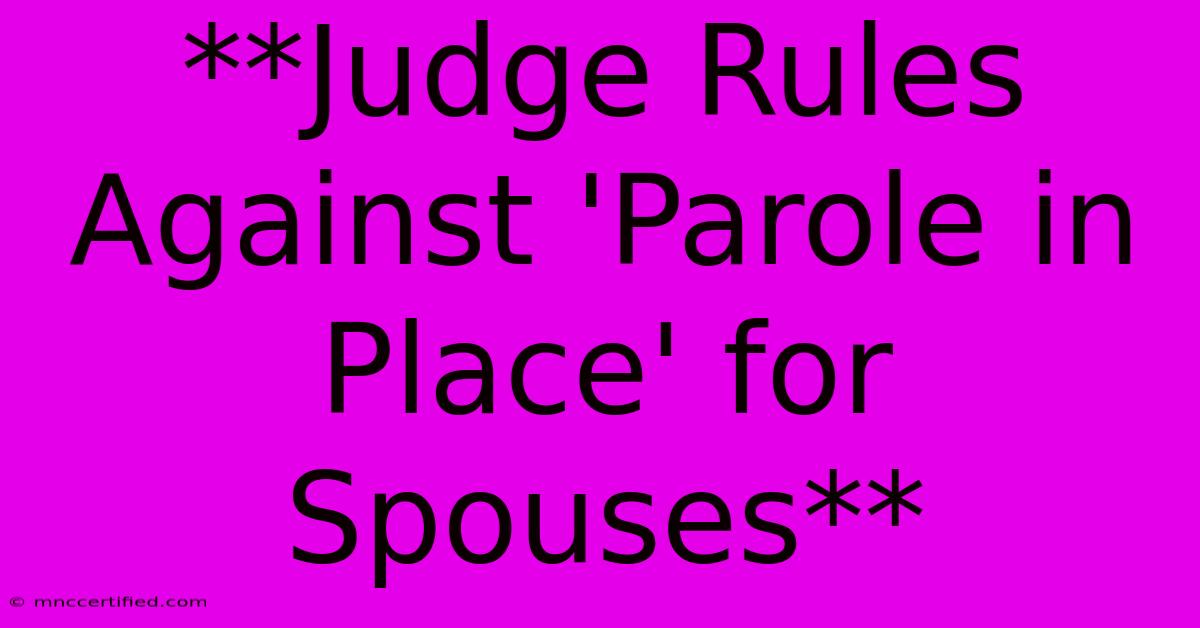**Judge Rules Against 'Parole In Place' For Spouses**

Table of Contents
Judge Rules Against 'Parole in Place' for Spouses: What This Means for Relationships
The concept of "parole in place" for spouses, often portrayed in movies and TV shows, has been dealt a blow by a recent court ruling. This controversial practice, where one partner essentially acts as a "parole officer" for their spouse, has been deemed legally unsound and potentially harmful. Let's delve into the details of this landmark ruling and its implications.
What is "Parole in Place"?
"Parole in place" involves a scenario where an individual, typically a spouse, agrees to monitor their partner's behavior and ensure they adhere to certain conditions, often in lieu of formal legal repercussions. These conditions might include curfews, restrictions on contact with specific individuals, or limitations on alcohol or drug use.
The Judge's Decision and Reasoning
In a recent case, a judge ruled against a "parole in place" arrangement proposed by a defendant accused of domestic violence. The judge argued that such agreements lack legal standing and can lead to several harmful consequences:
- Lack of Accountability: The judge emphasized that "parole in place" removes the individual from formal accountability and supervision. This can lead to a false sense of security and potentially enable further abusive behavior.
- Power Imbalance: Such arrangements inherently create a power imbalance within the relationship. The "parole officer" spouse is placed in a position of significant control, potentially increasing the risk of further manipulation or abuse.
- Limited Protection: "Parole in place" offers minimal legal protection for the victim. In the event of non-compliance, there are no clear legal repercussions for the offending party.
Implications of the Ruling
This landmark ruling has several significant implications:
- Shifting Perceptions: The judge's decision challenges the romanticized and often unrealistic portrayal of "parole in place" in popular media. It highlights the potential dangers and lack of legal legitimacy associated with such arrangements.
- Focus on Accountability: This ruling emphasizes the importance of formal legal processes and accountability in addressing domestic violence and other criminal offenses.
- Support for Victims: The decision underscores the need for victims to access formal support systems and seek legal remedies for their safety and protection.
Seeking Help: Resources for Victims of Domestic Violence
This ruling serves as a reminder that domestic violence is a serious issue that requires legal intervention. If you or someone you know is experiencing domestic violence, please remember you are not alone. Here are some resources that can provide support and guidance:
- National Domestic Violence Hotline: 1-800-799-7233
- The National Coalition Against Domestic Violence (NCADV): www.ncadv.org
Final Thoughts
This ruling represents a crucial step towards dismantling the harmful and misleading concept of "parole in place." It highlights the importance of legal accountability and reinforces the need for victims to seek support and protection through formal channels. Remember, there is help available, and you don't have to go through this alone.

Thank you for visiting our website wich cover about **Judge Rules Against 'Parole In Place' For Spouses**. We hope the information provided has been useful to you. Feel free to contact us if you have any questions or need further assistance. See you next time and dont miss to bookmark.
Featured Posts
-
Behind The Scenes Lord Mayors Show
Nov 09, 2024
-
Putin Praises Trump Ready For Cooperation
Nov 09, 2024
-
Bronny James Expected To Play In G League On Saturday
Nov 09, 2024
-
What Insurance Does Grow Therapy Accept
Nov 09, 2024
-
Life Insurance For People On Disability
Nov 09, 2024